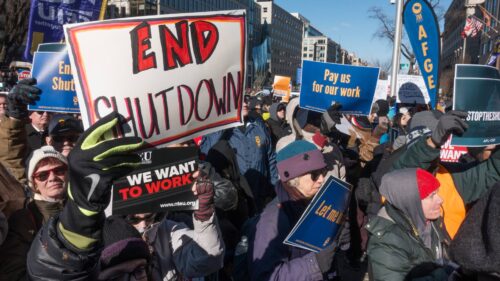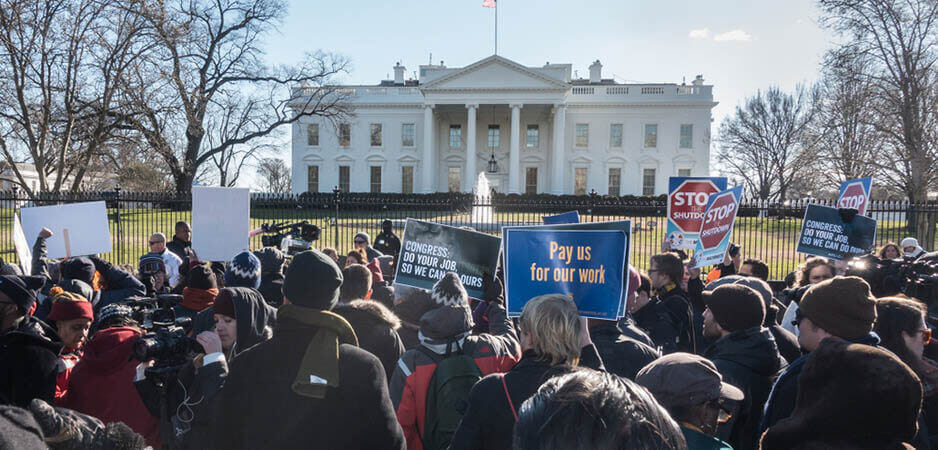Editor-in-Chief Atul Singh and FOI Senior Partner Glenn Carle, a retired CIA officer who now advises companies, governments and organizations on geopolitical risk, discuss the US government shutdown that began on October 1. Washington, DC, currently sees discussion during all waking hours and a shutdown at night.
The federal government has halted most operations. About 1.4 million employees have been told to stay home or work without pay. Three million contractors suffer and some positions are being eliminated. More than one million active-duty military personnel remain on the job and still receive pay, though even Republicans concede that redirecting funds might not be completely legal. Atul notes, “Some people are suffering enormously, as you can imagine.”
The hardship spreads far beyond Washington. Airports, hospitals and local governments that rely on federal data and funding feel the strain — they have reported delays in disbursements for infrastructure and education programs, while hospital administrators warn that Medicare and Medicaid reimbursements could soon slow. Additionally, contractors who provide essential services, from cybersecurity to food delivery, are left in limbo.
Cause of the shutdown
The shutdown stems from Congress again failing to pass a continuing resolution (CR) after missing appropriations deadlines for the fiscal year beginning September 1. The legislature holds the power to approve all spending from the Treasury. In theory, both houses pass the same budget, the president signs it and the government runs for the year.
In practice, however, Washington now governs by CRs — stopgaps that avoid genuine budgeting. Republicans control both chambers, but Senate rules require 60 votes. With 53 Republicans, the majority must win seven Democrats or independents, and has not. The result: paralysis. The previous record-setting shutdown under US President Donald Trump, from December 2018 to January 2019, lasted 34 days. Could this one beat its record?
Battle lines
Democrats say Trump and the Republicans have acted in bad faith and don’t want to feel cheated again. They are fighting to extend enhanced Affordable Care Act subsidies that expire at year’s end — a policy from US President Joe Biden’s administration that keeps premiums lower for 24 million Americans. More than half the recipients live in states that voted for Trump in 2024, which Democrats cite as proof that the extension is a bipartisan necessity. They also want funding restored to National Public Radio (NPR) and the television Public Broadcasting Service (PBS), calling them civic pillars that embody the public good.
Republicans counter that Democrats are clinging to temporary pandemic programs. They estimate the extension would cost $350–450 billion over ten years, which is untenable with the national debt at $37 trillion. To them, NPR and PBS are partisan mouthpieces. One Capitol Hill Republican told FOI they would “never give a thin red cent to NPR” and would let the shutdown continue rather than “feed the hand that bites us.” This fury cuts both ways: Democrats accuse Trump of destroying institutions while Republicans see Democrats as arrogant, despite their minority status.
The blame game and human toll
Food assistance for 42 million Americans through the Supplemental Nutrition Assistance Program ended on November 1. Even some Republicans, including Senator Josh Hawley from Missouri, privately admit they don’t want premiums to spike for their voters. Yet neither side has backed down. Atul calls it the blame game; “each side wants the other side to be seen as responsible for the shutdown and each side is unwilling to blink.”
Both parties privately believe they are winning this game. Democrats argue that voters will reject higher health premiums and view Republicans as reckless. Republicans counter that Democrats are overplaying their hand and will take the blame for economic pain.
The real-world effects mount. Federal workers seek temporary jobs in retail or delivery. FOI data show 57% of food-aid recipients live in Trump-voting states. Air traffic delays already exceed last year’s levels. If the shutdown lasts more than eight weeks, data collection, small-business lending, science grants and immigration processing will all stall.
A clash of philosophies
The deadlock hides an ideological war. “There truly is a deeply philosophical fundamental clash of principle,” Glenn comments.
Republicans pursue Project 2025, a blueprint to shrink the federal workforce and halve government responsibilities compared to January 1. They argue Washington should not subsidize media, healthcare or child nutrition. Democrats defend an activist state that feeds the hungry, combats disease and keeps citizens informed. This fight is less about numbers than about competing ideas of what government should be.
Economic fallout and democratic dilemma
Markets are already reacting. Air traffic controllers work unpaid, and investors demand higher returns on US bonds. FOI estimates that every week of shutdown trims 0.1 percentage points from annualized growth. If it lasts past mid-November, US Secretary of the Treasury Scott Bessent warns that the military itself may lose pay. Glenn fears prolonged uncertainty will strain global confidence in US finance and invite comparisons with debt crises once unthinkable for America.
The deeper issue here is democratic erosion, Atul believes. “Polarization … at its extreme is terrible for a democracy because democracy is about trade-offs, it’s about compromise, it’s about having at least a certain minimum agenda that you agree upon.” Glenn recalls that during the Cold War, “politics stopped at the shore.” Today, even that baseline is gone.
This battle over fiscal arithmetic is really a test of national character. The government may reopen, but the gulf between minimalist and activist visions of America will remain. For now, Washington remains frozen while the world’s largest economy waits to see which side blinks first.
[Lee Thompson-Kolar edited this piece.]
The views expressed in this article/video are the author’s own and do not necessarily reflect Fair Observer’s editorial policy.













































Comment